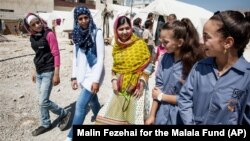Nearly twice as many girls are denied an education as boys.
That is according to a new report by the United Nations Education, Scientific and Cultural Organization (UNESCO). The report was released to mark International Women’s Day on Tuesday.
A lack of educational options “stunt the lives of girls and women from one generation to the next,” said UNESCO Director-General Irina Bokova.
Across sub-Saharan Africa, 9.5 million girls will never walk into a classroom, compared to 5 million boys, according to the UNESCO report. More than 30 million children aged six to 11 are out of school across the region.
The gender gap is wider in South and West Asia, where 80 percent of girls will never enter formal education -- compared to 16 percent of boys, according to the report.
Girls are the majority of the millions of children denied school in Arab nations, UNESCO said. But the organization said exact numbers are not available because of conflicts in the region.
Discrimination against girls and women drew worldwide attention in 2012 when Malala Yousafzai, then 15, was shot in the head on her way home from school in Pakistan. The Taliban targeted her and her family because they called for more and better education for girls.
Malala survived the attack, after successful surgery in England, and continued to advocate for girls education. She gave a speech on her 16th birthday to the United Nations. She wrote a book, “I Am Malala: The Girl Who Stood Up for Education and Was Shot by the Taliban.”
In 2014, Malala won the Nobel Peace Prize.
Alice Albright, chief executive of the Global Partnership for Education, said Malala Yousafzai helped show the plight of girls and women.
Albright said discrimination against girls is even worse after elementary school.
Girls face more barriers than boys to further their education.
The reasons differ, but include parents deciding they need their children to work in fields or do other work, Albright said. She adds that it is far more likely that girls are chosen for these tasks.
Another reason is that girls are often forced into marriages after elementary school.
Girls are also more likely to have no way of getting safely to school -- given military conflicts and crime problems in some countries.
And sometimes, girls or their parents decide against continuing education because, at many schools, girls and boys share the same bathrooms, Albright said.
Adding to the problems girls have getting an education is a lack of school buildings and teachers in many poor nations. Boys often get the chance at scarce resources.
“I do think some progress is being made, but by no means is it enough progress,” Albright told VOA Learning English.
The challenge to improving access includes changing long-held cultural views, she said.
She said it is important that her group and others show the “many benefits” of improving access to education for girls.
In a recent report, the Global Partnership for Education said educated girls are far more likely to get better jobs and more income. They are also likely to give birth to healthier children. And girls that remain in school past elementary school are less likely to be put into forced marriages or to marry as children.
A recent Brookings Institution report said better educated girls and women generally have fewer children. And that could reduce population growth in some of the world’s poorest nations.
Bruce Alpert reported on this story for VOA Learning English. Kathleen Struck was the editor.
We want to hear from you. Write to us in the Comments Section or share your views or educational experiences on our Facebook Page.
________________________________________________________________
Words in This Story
stunt – v. to stop someone from growing or developing
plight – n. a very bad or difficult situation
elementary – adj. first grades of school
bathroom – n. a room with a sink and toilet
challenge – n. to test the ability, skill, or strength of someone
generally – adj. in a way that is not detailed or specific





